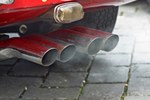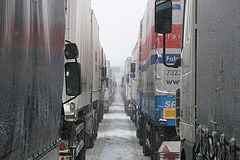News
Eurovignette III: no HGV toll for the Alps
May 04, 2011
/
alpMedia
In the future haulage companies in the EU could have to pay for environmental damage. The EP Transport Committee has agreed to the proposal. But environmental organisations feel the proposal does not go far enough - especially in the Alps.
The draft bill for the amendment to the Eurovignette Directive stipulates that HGVs should pay to use motorways and, for the first time, pay an additional small "external costs charge" for noise and air pollution. The European Parliament is currently reviewing the Directive. The Transport Committee approved the proposal with a large majority in mid-April. However, according to environmental organisations, these measures are not very ambitious; in fact, they are disappointing. They felt there were numerous loopholes and that sensitive regions such as the Alps were receiving far too little attention. They even wondered whether the interests of transport companies had prevailed. For example there appear to be discounts for frequent drivers, which has a particular impact on the Alps as a transit region. An additional fee can be levied for investments into alternative transport projects and the upper limit for air and noise pollution costs are slightly higher. However, compared with the costs actually incurred for environmental damage it was far too little, as Heike Aghte of the LSVA for Europe Alliance remarked. The Transport Committee also rejected the multiplier factor of 5 for noise costs in mountain regions. The MEPs also said no to the possibility of charging an additional fee for particularly sensitive Alps alongside the fees for external costs. This would only be possible for the most highly polluting HGVs of EURO classes 0 to 3. However, there are now very few of these HGVs on the road in the Alps.
Nonetheless, "the amendment to the Eurovignette Directive will at least provide practical ways of adding a few more cents per kilometre," says Aghte. The MEPs have rejected additional bureaucratic obstacles that would have made it very difficult to internalise external costs. Fees can also be levied for up to eight hours for regions frequently subjected to congestion. These fees are around 200 per cent higher than the fees for periods without congestion. And last but not least the EU Commission will be required to introduce proposed legislation for internalising the costs for the climate and the loss of biodiversity. The European Parliament will vote on the Directive on the charging of heavy goods vehicles in a plenary session to be held in June. The Council is to deliberate once again in the autumn. Sources: www.eu-koordination.de/umweltnews/news (de), www.lsva.eu/EU/110410-vignette-vote.html (de), www.actu-environnement.com/ae/news (fr)
Nonetheless, "the amendment to the Eurovignette Directive will at least provide practical ways of adding a few more cents per kilometre," says Aghte. The MEPs have rejected additional bureaucratic obstacles that would have made it very difficult to internalise external costs. Fees can also be levied for up to eight hours for regions frequently subjected to congestion. These fees are around 200 per cent higher than the fees for periods without congestion. And last but not least the EU Commission will be required to introduce proposed legislation for internalising the costs for the climate and the loss of biodiversity. The European Parliament will vote on the Directive on the charging of heavy goods vehicles in a plenary session to be held in June. The Council is to deliberate once again in the autumn. Sources: www.eu-koordination.de/umweltnews/news (de), www.lsva.eu/EU/110410-vignette-vote.html (de), www.actu-environnement.com/ae/news (fr)



